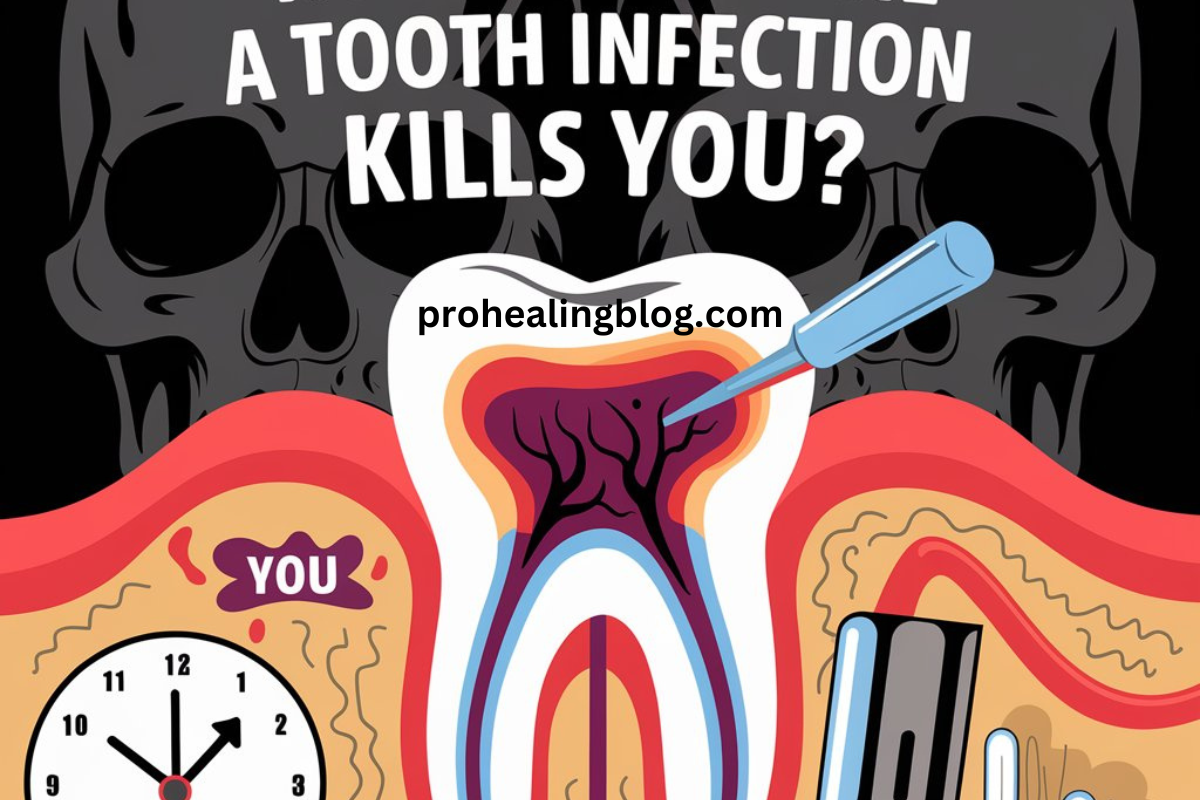Tooth infections are serious business. While rare, they can lead to life-threatening complications if left untreated. It’s crucial to understand how long until a tooth infection kills you, what risks are involved, and how to prevent dangerous outcomes.
When you get a tooth infection, it can start out as something as simple as a cavity. But if the infection spreads to the soft tissues or bloodstream, it can be life-threatening. So, how long until a tooth infection kills you? The short answer is: it depends. Let’s break it down.
What Is a Tooth Infection?
A tooth infection is usually caused by bacteria entering the tooth through a crack or cavity. Once inside, the bacteria can spread to the pulp—the center of the tooth containing nerves and blood vessels. If left untreated, the infection can spread to surrounding areas, including the gums, jaw, and even the bloodstream.
If the infection reaches the bloodstream, it can cause sepsis, a life-threatening condition that requires immediate medical intervention.
See also: The Ultimate Hair Care Routine: Steps, Tips, and Best Practices for Healthy Hair
How Long Until a Tooth Infection Kills You?
The time it takes for a tooth infection to become life-threatening varies depending on several factors:
- Severity of the infection: If the infection is mild, it may take weeks or even months to cause serious issues. However, severe infections can spread quickly.
- Your immune system: A healthy immune system can fight off the infection faster, whereas a compromised immune system (due to diabetes, cancer treatments, or other health issues) may allow the infection to spread faster.
- Location of the infection: Infections that spread to the jaw, sinuses, or neck can be more dangerous and progress faster. Infections near vital organs, like the brain or heart, pose a bigger risk.
Most cases of tooth infection can be treated within 48 hours to a few days with proper antibiotics. However, if the infection is left untreated, complications can arise within several days to weeks.
The 4 Key Risks of an Untreated Tooth Infection
While rare, untreated tooth infections can cause serious consequences. Here are the four most common risks:
- Sepsis Sepsis is the body’s extreme response to infection. If bacteria from a tooth infection enter the bloodstream, they can trigger sepsis. Symptoms include fever, rapid heart rate, confusion, and difficulty breathing. Sepsis is life-threatening and requires immediate treatment.
- Ludwig’s Angina Ludwig’s Angina is a severe infection of the floor of the mouth that spreads quickly. It can cause swelling and make it difficult to breathe, leading to death if not treated urgently. This type of infection usually starts in the lower teeth and spreads to the soft tissue under the jaw.
- Brain Abscess If the infection spreads to the brain, it can lead to a brain abscess—a pocket of pus. Symptoms include headaches, seizures, and neurological problems. A brain abscess is a serious condition that requires surgery and antibiotic therapy.
- Osteomyelitis This is an infection of the bone. When a tooth infection reaches the jawbone, it can cause osteomyelitis, which can destroy bone tissue and lead to permanent damage. Treatment often involves surgery to remove infected tissue.
How to Spot a Tooth Infection
It’s crucial to catch a tooth infection early to avoid severe consequences. Here are some signs you should look out for:
- Severe tooth pain: This is usually the first symptom. The pain may be sharp, constant, or throbbing.
- Swelling and redness: The gums around the infected tooth may become swollen, and you might see redness.
- Fever: If the infection is spreading, you may develop a fever.
- Bad taste in your mouth: Pus from the infection can create a bad taste or foul odor.
- Difficulty swallowing or breathing: This could signal that the infection is spreading to your throat or airway.
If you notice any of these symptoms, it’s time to seek treatment from a dentist or healthcare provider immediately.
Can a Tooth Infection Kill You Quickly?
In most cases, a tooth infection does not kill someone instantly. However, the progression can be fast, especially if the infection is severe or untreated. A person’s health condition and how quickly they receive treatment are the main factors in how long a tooth infection will take to cause life-threatening damage.
For example, untreated infections in the neck and jaw can spread rapidly. In as little as 48 hours, a serious infection could lead to life-threatening conditions like Ludwig’s angina or sepsis.
See also: Low Sodium Cancer Symptoms: Health Impacts and Awareness
What to Do If You Have a Tooth Infection
If you suspect you have a tooth infection, seek dental treatment immediately. Here’s what typically happens:
- Diagnosis: A dentist will likely take an X-ray to determine the extent of the infection.
- Antibiotics: If the infection is caught early, your dentist may prescribe antibiotics to help eliminate the bacteria.
- Drainage: If an abscess has formed, it may need to be drained to relieve pain and prevent further spreading.
- Root Canal: If the infection has spread into the tooth pulp, a root canal may be necessary to save the tooth.
- Tooth Extraction: In extreme cases, the tooth may need to be removed to stop the infection from spreading.
The sooner you get treatment, the better the outcome. This can often prevent the infection from turning fatal.
Prevention: How to Avoid Tooth Infections
For Answer to this question that how long until a tooth infection kills you is minimize your risk of a tooth infection, practice good oral hygiene:
- Brush your teeth twice a day with fluoride toothpaste.
- Floss daily to remove food particles and plaque between your teeth.
- Avoid sugary foods and drinks, which can cause cavities.
- See your dentist regularly for check-ups and cleanings.
- Don’t ignore dental issues: If you have tooth pain, swelling, or sensitivity, get it checked out immediately.
Taking care of your oral health can save you from the risks of tooth infections.
How Long Does It Take for a Tooth Infection to Kill You?
The time it takes for a tooth infection to cause life-threatening complications can vary. However, if left untreated, a tooth infection could cause sepsis or other serious conditions in as little as two to three weeks. In rare cases, death can occur if treatment is delayed for a long time.
Final Thoughts: The Importance of Timely Treatment
While it’s unlikely that a tooth infection will kill you, the potential risks are serious enough to warrant prompt attention. Recognizing the signs of a tooth infection and seeking timely treatment is crucial to avoid severe complications. Never ignore tooth pain, swelling, or other symptoms that could indicate an infection.
Don’t wait until it’s too late—visit your dentist if you suspect you have a tooth infection.
See also: PODN : Health and Tech Impacts Explored
FAQs:
How fast can a tooth infection become deadly?
A tooth infection can become life-threatening in as little as two weeks if untreated. Severe cases like sepsis can develop quickly, requiring immediate medical care.
What are the first signs of a tooth infection?
The first signs typically include severe tooth pain, swelling around the tooth, fever, bad taste in the mouth, and sometimes difficulty swallowing or breathing.
Can a tooth infection spread to the brain?
Yes, a tooth infection can spread to the brain, leading to a brain abscess. This is a rare but serious complication that requires urgent medical treatment.
What happens if you don’t treat a tooth infection?
If untreated, a tooth infection can lead to complications like sepsis, Ludwig’s angina, brain abscesses, and osteomyelitis, all of which can be life-threatening.
How do dentists treat a tooth infection?
Dentists treat tooth infections with antibiotics, drainage of abscesses, root canals, or even tooth extraction, depending on the severity of the infection.
Is a tooth infection always fatal?
No, tooth infections are rarely fatal when treated properly. Timely intervention can prevent complications and ensure a full recovery.
Can you die from a tooth abscess?
In very rare cases, a severe, untreated tooth abscess can lead to complications like sepsis, which can be fatal. Early treatment is essential.






